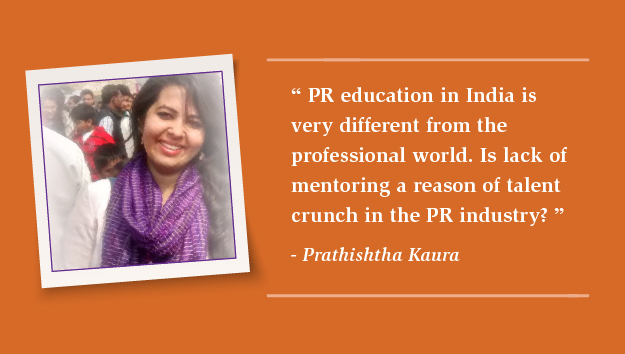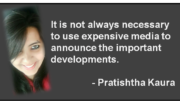For all the millennial PR professionals out there, we have all atleast once felt the pressure that our profession brings in. From preparing multiple coverage reports to the real time tracking of your client on social media to handling multiple accounts and managing the egos of the journalists, our job requires it all to be accomplished. The first few years on the job actually act as the litmus test for a person in PR and with the multiple options existing at that stage, often people are seen moving out of the profession.
One of the major reasons for this is that PR education in India is very different from the professional world. A young, out of the college student enters the PR arena after reading numerous books that are far away from the actual PR business that demands them to have basic Microsoft Office skills and how to talk to the media in the right way. Many PR professionals have been calling for a change in PR curriculum but it is still a long way to achieve something of this sort. Essentially, in a PR consulting firm, there is dearth of time faced by people across the levels. We all juggle between our multifarious roles of pitching to the media, executing day to day tasks and managing client expectations. Hence, the managers are usually running out of time to train the beginners and micro-manage them. Which brings in the question, is lack of mentoring a reason of talent crunch in the PR industry?
If we go by the dictionary, PR is an industry based on a well-rooted structure of mentorship. PR professionals mentor their clients in the field of communication, aiding them in meaningful information dissemination to eventually facilitating long term image building. It is the PR professionals who tread the extra mile to generate credible exposures using their networking skills. This actually creates an ironical situation since the people who are in a way mentoring their clients are not able to mentor their peers. It is essentially due to this reason that the industry faces a talent crisis unlike other professions. This results in a chunk of people who have reached a particular stage of experience in their professional careers but are lagging in terms of the skills required to meet the ever evolving demand of the profession.
This brings in the concept of reverse mentoring. It may sound like a new-fangled concept, however, the term dates back to 1999, when the then-CEO Jack Welch of General Electric introduced it to help his employees learn how to use the Internet. Today, companies such as Accenture, IBM and Procter & Gamble among many other companies have formal reverse mentoring programs to boost their brands. Both the mentor and the mentee learn from each other in this type of program, the young learning from the older one’s experience and the older one learning the new age skills about technology or social media from the young.
Lot of engagement is required to manage the restless and unpredictable nature of the young talent of today and reverse mentoring is one of the ways to keep the young talent engaged in a manner that they feel important part of the organization. Investment of time in training along with the regular feedback sessions will help address this issue. Along with this another important step is to instill managers with essential mentorship skills.
Also, what is really required here is that PR needs to be marketed well enough as one of promising careers. With the race for digital integration, when the PR and communications world is converging, it needs to be put out to the world that the profession is not mundane and boring but challenging and rewarding.
Summing up, while mentoring plays its own role in defining the career of young individuals, one’s career is one’s own responsibility. A mentor can only show the direction; steering your career and treading on the right path is in your own hands. To remain adept for the profession, we all need to keep learning especially in a profession like PR!







Be the first to comment on "From Dearth of Mentoring To Reverse Mentoring: Finding Yourself the Right PR Mentor"